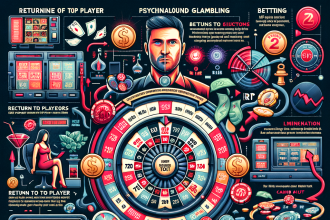Casinos, whether online or brick-and-mortar, are places filled with excitement, thrill, and the promise of winning big. However, they can also be breeding grounds for scams and fraudulent activities aimed at unknowing players. As the popularity of gambling increases, so does the ingenuity of scammers who devise various tactics to exploit vulnerable players. In this article, we will explore the deceptive tactics behind casino scams, identify the red flags to watch out for, and arm you with the knowledge you need to protect yourself.
Understanding the Deceptive Tactics Behind Casino Scams
The Allure of “Too Good to Be True” Offers
One of the primary tactics used by scammers in the gambling world is the lure of offers that are simply too good to be true. These promotions often include unrealistically high bonuses, free spins that seem endless, or contests that promise massive payouts for minimum effort. While legitimate casinos do offer promotions, the key distinction lies in the terms and conditions attached. Scammers will often hide excessive wagering requirements or unrealistic conditions that make it nearly impossible for players to cash out their winnings.
Examples of Unrealistic Offers
- 100% Match Bonuses: While many casinos offer match bonuses, a bonus that doubles your deposit without any caps or requirements should raise suspicion.
- No Wagering Requirements: Offers that promise winnings without the need to wager are typically a red flag, especially if they come from lesser-known casinos.
- Limited-Time Offers: Scammers often create a sense of urgency by promoting limited-time offers, pressuring players to act quickly without proper scrutiny.
Fake Websites and Phishing Scams
With the rise of online gambling, phishing scams have become a prevalent concern. Scammers create fake websites that mimic the appearance of reputable casinos to trick players into providing personal and financial information. These sites often use familiar logos, similar URLs, and attractive layouts to deceive visitors. Once players input their information, they become victims of identity theft or financial fraud.
Signs of Phishing Scams
- URL Discrepancies: Check for small typographical errors in a website’s URL. A site like
www.example-casino.commay have a scam site that iswww.example-casinos.com. - Poor Website Quality: Reputable casinos invest in their websites. A site with low-quality graphics, broken links, or a lack of customer service options is suspicious.
- Unverified Licensing Information: Legitimate online casinos are licensed by recognized regulatory bodies. If a site claims to be licensed but lacks verification, exercise caution.
Rigged Games and Software Manipulation
Another alarming tactic used by some online casinos is the manipulation of game outcomes. While the vast majority of online casinos use Random Number Generators (RNGs) to ensure fairness, some unscrupulous operators may employ rigged software that skews results in their favor. This can include games like slots, roulette, and poker, where players are led to believe they are playing a fair game.
How to Recognize Rigged Games
- Lack of Independent Audits: Legitimate casinos will undergo regular audits from third-party organizations to certify their RNGs. If a casino doesn’t display these certifications, proceed with caution.
- Unusual Win Ratios: If you notice a pattern where players consistently lose or the payouts seem unusually low over time, this may indicate foul play.
- Unexplained Discrepancies: If you win a game but are denied your payout without a valid explanation, it’s a significant warning sign.
Identifying Red Flags: Protect Yourself from Fraudulent Practices
Lack of Transparency and Poor Customer Service
One of the most telling signs of a fraudulent casino is a lack of transparency regarding its operations. Reputable casinos will provide clear and comprehensive information about their policies, including payment processing, bonuses, and customer support. If a casino is vague or evasive about these aspects, consider it a significant red flag.
Customer Service Indicators
- Limited Contact Options: A legitimate casino offers multiple ways to reach customer service, such as live chat, email, and phone support. If a website only provides a contact form or no contact information at all, be wary.
- Slow Response Times: If customer service takes an excessive amount of time to respond to inquiries or fails to address your concerns adequately, this may indicate a lack of professionalism or accountability.
- Negative Reviews and Feedback: Researching player reviews can provide insights into a casino’s reputation. If a casino has a plethora of negative reviews concerning payment issues or poor service, it’s wise to avoid playing there.
Unusual Payment Methods
Another red flag when assessing the legitimacy of a casino is the variety of payment methods they offer. While some casinos may provide unconventional payment options, a lack of reputable payment methods can signal potential scams. Legitimate casinos typically support well-known payment processors and methods, such as credit cards, PayPal, and bank transfers.
Warning Signs Related to Payment Methods
- Cryptocurrency Only: While many casinos now accept cryptocurrencies, a casino that only allows deposits in cryptocurrency may be attempting to evade regulatory scrutiny.
- Unverifiable Payment Processors: If a casino uses obscure payment processors or asks players to wire money directly to an unknown account, it is a significant red flag.
- High Fees or Long Withdrawal Times: Excessively high fees for withdrawals or unusually long processing times can also indicate a scam.
Ignoring Responsible Gambling Practices
Lastly, legitimate casinos prioritize responsible gambling and offer features that promote safe gaming. If a casino neglects to provide responsible gambling tools or fails to encourage players to set limits on their spending, it should raise concerns about its ethics and legitimacy.
Responsible Gambling Practices to Look For
- Self-Exclusion Options: Reputable casinos allow players to self-exclude if they feel they are developing a gambling problem.
- Deposit Limits: Legitimate casinos enable players to set daily, weekly, or monthly deposit limits to help manage their gambling habits.
- Information Resources: Casinos that care about their players will provide resources and information about responsible gambling.
| Red Flag | Description |
|---|---|
| Unrealistic Offers | Too good to be true promotions with hidden conditions |
| Phishing Websites | Imitations of legitimate casinos aimed at stealing information |
| Rigged Games | Manipulated game outcomes to favor the house |
| Lack of Transparency | Poor customer service and vague policies |
| Unusual Payment Methods | Reliance on obscure or unsafe payment methods |
| Ignoring Responsible Gaming | Lack of tools for responsible gambling |
Conclusion
Navigating the world of casinos can be thrilling, but it is essential to remain vigilant against scams and fraudulent practices. By understanding the deceptive tactics employed by scammers and identifying the red flags that signal potential fraud, players can protect themselves from falling victim to these schemes. Always conduct thorough research, choose reputable casinos, and remain aware of the warning signs. Ultimately, knowledge is your best defense against casino scams, ensuring that your gaming experience remains both enjoyable and secure.









